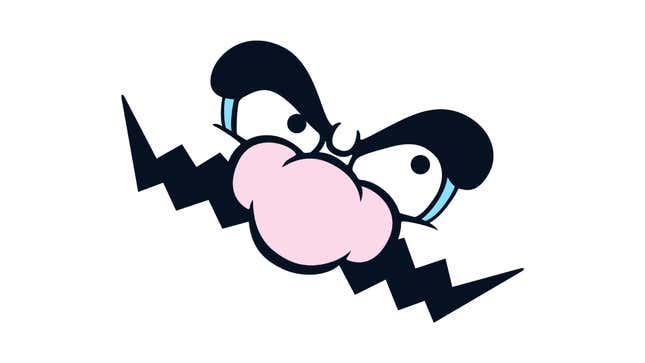
Mario was back for another adventure. But this time, it was personal. Hiroji Kiyotake, the director of 1992’s Game Boy hit Super Mario Land 2: Six Golden Coins, wanted to pursue the idea that this time Mario wouldn’t be fighting to help or save someone else. Hence: Wario, Mario’s greed-and-crime-focused rival.
Super Mario’s World is a look at the characters that turned the Mario franchise into a household name for 35 years.
While Mario was off doing Mario Things, Wario steals his house and all of his shit. That’s it. No royal kidnappings or turtle armies. Just a pretty basic scenario where a man takes another man’s castle. Yet Wario couldn’t fully become the loveable asshole I like so much until he was fenced off from the rest of the Mario franchise.
Wario is my favorite type of villain, a twisted inversion of the hero in every way. Where Mario is agile and heroic, Wario is beefy as hell, more likely to body check an enemy into oblivion than pirouette on top of their heads. Mario is so removed from normal human experiences that we were all freaked out when we saw his nipples. Wario is, possibly, too human: he eats garlic constantly and weaponizes his farts, making him Nintendo’s first canonically bad-smelling character. Even his name, combining “Mario” with “warui,” the Japanese word for “bad,” is clever in its opposite simplicity. His hat is just Mario’s with the letter flipped upside down.
The thing is, Mario already had a dedicated villain in his life, and it’s hard, really, to outdo the Great Demon King Koopa in terms of menace or sheer collateral damage. So like Donkey Kong before him, Wario shifted from antagonist to misunderstood antihero in the span of one game. To this day, people still erroneously call him a villain, or a rival, to Nintendo’s main mascot. And sure, he’s definitely a jerk. But Wario has remained surprisingly relevant since his monochrome origins by focusing on one weirdly specific aspect of the Mario franchise: greed.
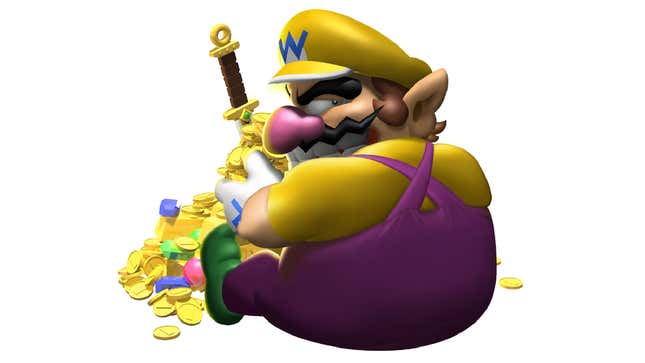
The entire Mario franchise runs on gold. One of the first things you’ll see in the original Super Mario Bros. is a line of floating gold coins. Mario has undoubtedly collected millions of them throughout the years, but they’re almost incidental, like picking up a dollar off the sidewalk. (And depending on the game, he immediately reinvests those coins in the local Toad House economy.) For Wario, the gold is the point, and anything else is bullshit. That laser-focused clarity has allowed him to remain consistent and relevant across decades, even as his games underwent massive reinvention. More than that, it’s why Wario is too good, too pure, to really belong in Mario’s world anymore.
The Mushroom Kingdom contains heroes, villains, wizards, dinosaurs, and cowards. But apparently, it can’t handle assholes. And Wario is an unapologetic asshole until the end. That’s what makes him great.
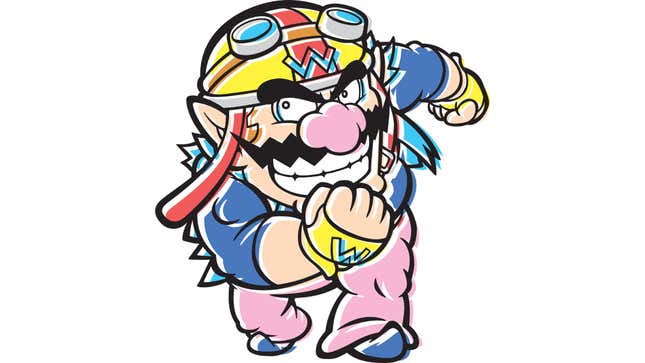
The theme of Wario as a character, and the driving factor of all his games, is greed. Gamers, conditioned through collect-a-thons and completionist-skewing achievements, are already used to going the extra mile and razing digital villages to collect all of the shiny things. Wario just gave a sneering face and quasi-unkillable body to their natural instincts.
So when the first Wario Land game was released on the Game Boy in 1994, most players didn’t need much of a push to embrace its storyline of wrecking a bunch of pirates to get their gold. But it wasn’t just any gold; it was a golden statue of Princess Peach that Mario himself was already trying to win back. By stealing it first, Wario would show up his rival while also securing an even bigger payday for himself in the process.
And that’s what makes Wario an asshole: greed mixed with pettiness and spite. But those are hungry emotions; they need to grow and spread over time.
While Mario’s adventures escalated over time in response to Bowser’s increasingly ambitious war crimes, the concurrent Wario titles on the Game Boy, Game Boy Advance, and even the Virtual Boy, saw Wario’s greed and spite hit a wall. His 2D puzzle-platformers, while great, were already becoming a blur of pirate hoards and ancient treasures. But remember: Wario isn’t an adventurer or an explorer. He just does that stuff for cash. It’s easier to rob someone than work for them, and it’s easier to steal a house than build one. Wario is special because he embraces and advertises his spite and greed, and those parts of him needed a new outlet.
So Wario became a games publisher. In 2003, Wario was introduced to the world of modern capitalism and game design, realizing he could make way more money pumping out a cheap, trendy video game for the masses than he ever earned raiding tombs and fighting pirates. The WarioWare franchise was born.
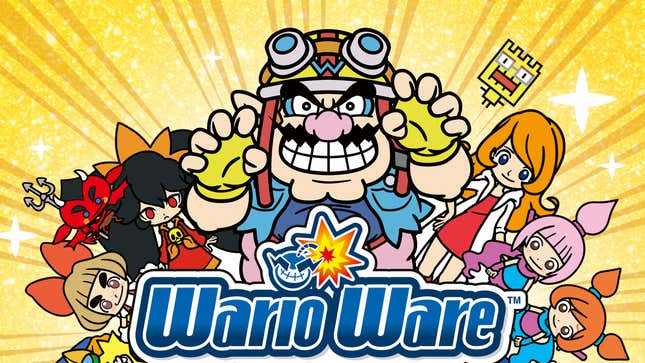
I played 2003’s GBA WarioWare, Inc.: Mega Microgame$! constantly. It was a game that, despite the wild greed that was the defining feature of its main character, felt generous in its design. The more I played, the more I seemed to discover and unlock. Wario, now a motorcycle-driving venture capitalist with a network of friends/marks in the tech industry, fit seamlessly into a strange, loud parody of modern society and Nintendo itself. It was a weirdly perfect fit, and hard proof that the rules and sensibilities of the main Mario franchise (including color-coded overalls) were holding Wario back.
In the game, Wario tricks his friends into helping him design a video game, reasoning to himself that if they all split the labor, he’ll only have to do a fraction of the work himself. (In a further meta-joke, Wario’s own games are the most simple, crude, and self-serving of them all.) The gameplay itself, an escalating deluge of five-second “microgames,” is as inspired today as it was back then. The game was developed by a six-person team in secret until they felt comfortable enough to present it to management, making its real-world development just as edgy and punk rock as the game itself.
WarioWare, Inc. ends with Wario learning that his hastily-assembled video game has become a massive hit. He then promptly steals all of the money he had promised to split with the other developers and flees the scene in a spaceship. In 2021, it feels almost prophetic. Wario had graduated from being a mirror-image nemesis of Mario to becoming a mirror-image nemesis of Nintendo itself. He can’t go back to existing in Mario’s sphere of castles and kingdoms: he has literally grown too big in his satire and stature to make sense as part of that world.
So of course WarioWare franchise essentially absorbed and replaced the prior Mario-clone version of the character, at least in Wario’s standalone games. Why would he go back to risking his life for gold coins when he can convince other people (including the players themselves, in WarioWare D.I.Y.) to make a bunch of profitable sequels and reboots for him instead?
Which brings us to the enduring, confusing power of Wario as a character: He’s a loud, stinky, greedy jerk, but he’s not wrong. He exists to let Nintendo (and by extension, players) break their own rules of good taste and good manners. He’s their Deadpool, their LEGO Star Wars, or their Itchy and Scratchy Show. He’s a rude, gross, vital creative outlet for Nintendo. And that’s why he’s more lovable than he has any right to be.
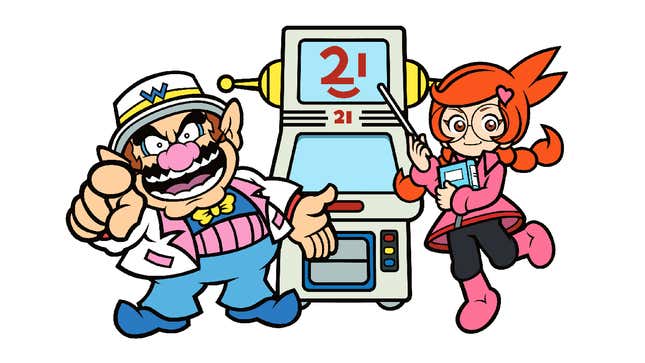
Wario hasn’t kidnapped anyone, which automatically makes him more forgivable than Bowser. His first crime was stealing Mario’s castle, which is, historically, the main thing that happens with and to castles. He’s a dick, but you can kind of see his point.
The same goes for his rivalry with Mario: If your entire world was defined by a single, universally-beloved hero, wouldn’t you want to take him down a peg? Especially if people insisted on comparing you to each other? The two characters originally did very similar things in their games, but their attitudes ultimately drove them in different creative directions. And attitude is everything when it comes to letting us relate to a character.
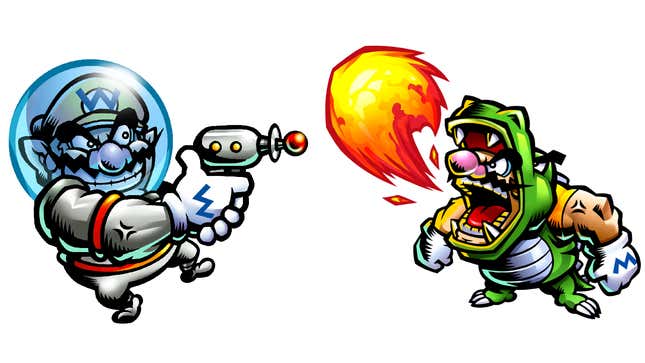
There’s a level of player-controlled chaos in gaming, somewhere between following the direction of a designer to the letter and the unleashed power of PC mods and Grand Theft Auto cheat codes. In this middle place, you’ll find Untitled Goose Game or the giddy joy of breaking every pot inside someone’s house in a Zelda title. You’re not breaking the rules of a game, but you’re definitely being more of a jerk than you would usually be in real life. It’s a vibe and an attitude.
Wario is Nintendo’s avatar for that space. He farts, steals, and brutalizes his way to the end of all of his stories. In his platformers, he’s unkillable and unstoppable. In his microgame collections, he’s both a parody of the short attention spans and hype-chasing natures of the modern game industry and a successful product of it. His jerkiness was ahead of its time, and that kept him both relevant to modern audiences and also trapped him in his own fenced-off version of Nintendo canon.
As much as I talk about Wario being relevant to modern audiences, 2018’s WarioWare Gold for the 3DS was his first new title in eight years, and it was a beefed-up greatest hits collection. Entire generations of fans don’t really know why Wario has his whole biker look. His entire cast of characters (including Ashley, with her goofy earworm of a theme song) from Diamond City exists in a pocket dimension purposefully disconnected from any of Nintendo’s wider plans. And maybe that’s for the best.
Wario was conceived out of a desire to put a twist on the familiar, but his creators tapped into a powerful, universal constant: The Unrepentant Asshole. His games were reinvented as a passion project, mostly as a way to add a recognizable name to a weird concept. He has survived decades and a full-on reboot by steering clear of the considered, controlled trajectory of Nintendo’s main franchises. And in that way, he’ll be ready for the next time a fresh, subversive game idea needs a dirtbag to take the heat and protect Nintendo’s otherwise squeaky-clean image.
Mike Sholars is a freelance pop-culture writer who believes that the best way to celebrate the things you love is to roast them relentlessly. He loves video games and anime. Follow him on Twitter @Sholarsenic.